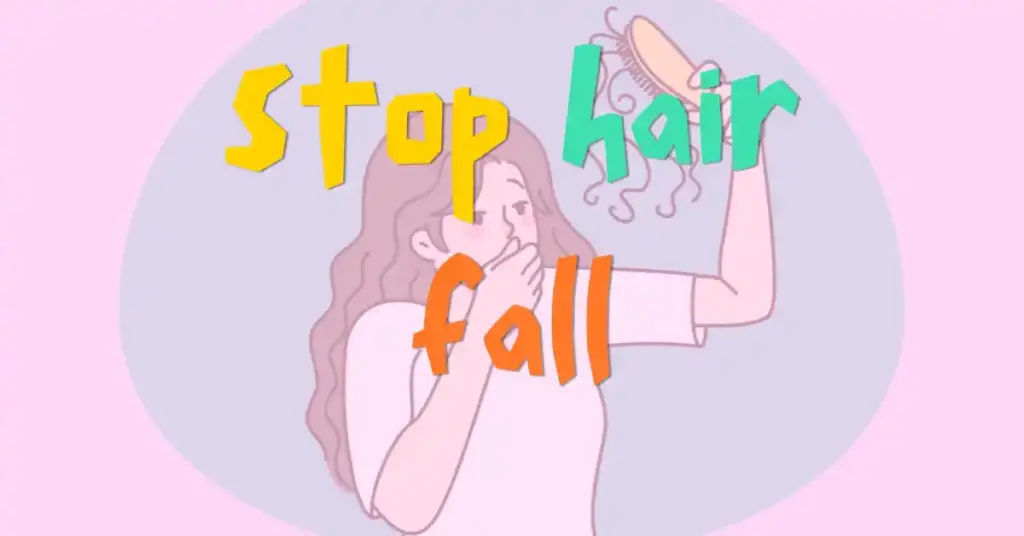Introduction
Hair loss is a common issue affecting millions worldwide, regardless of age or gender. This guide focuses on hair loss prevention, focusing on natural remedies and lifestyle changes to maintain a healthy, vibrant mane. Healthy hair is essential for protecting the scalp, regulating body temperature, and boosting confidence. Factors triggering hair loss include genetics, hormonal changes, medical conditions, and stress. Natural methods and lifestyle adjustments can address many causes of hair loss. The guide offers a toolkit of tips and tricks to help maintain healthy hair.
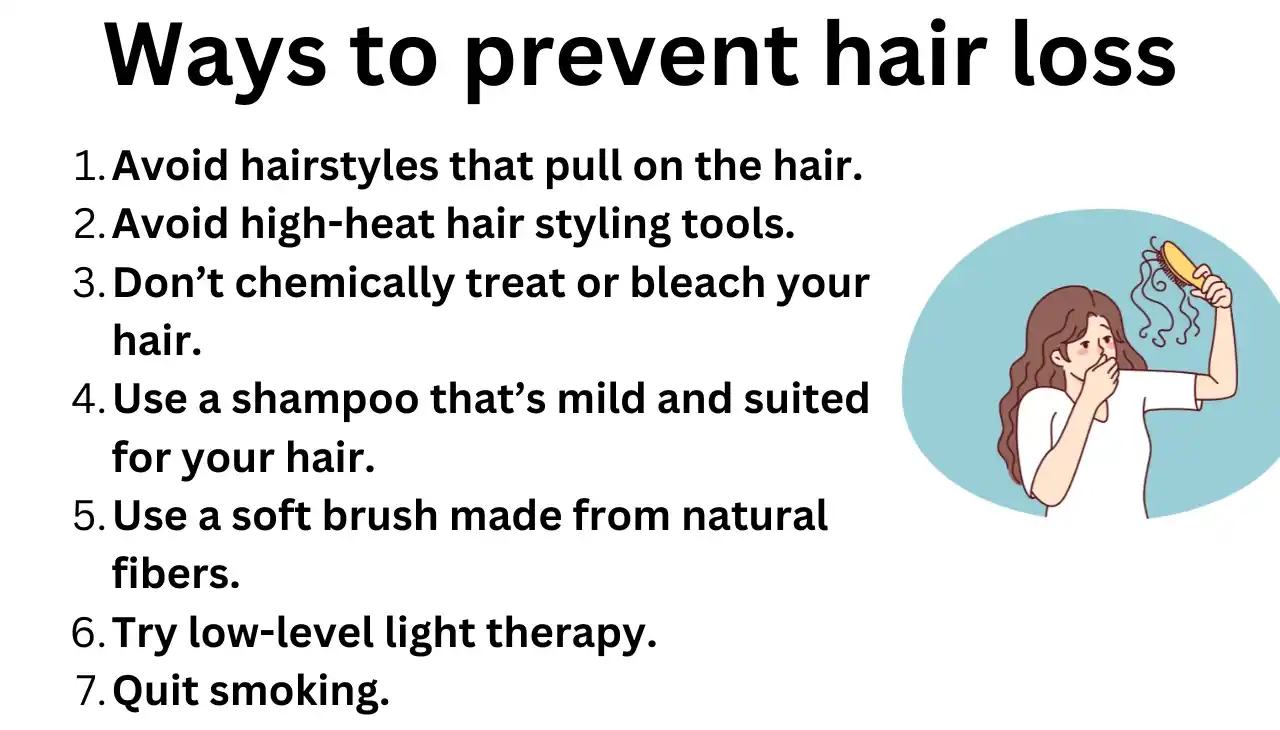
Stop your hair fall immediately
Hair fall can be distressing, but there are steps you can take to help prevent it. Here are some tips:
- Diet and Nutrition:
- Mediterranean Diet: Consider the Mediterranean diet, which contains raw vegetables and fresh herbs. These nutrients may lower the likelihood of androgenic alopecia (female or male pattern baldness) or delay its start.
- Protein: Hair follicles are mostly composed of protein (keratin). Ensure that your diet has enough protein to promote healthy hair development. Eggs, lean meats, seafood, legumes, and nuts are excellent sources of protein.
- Hair Care:
- Scalp Massage: Regularly massage your scalp with oils such as coconut oil, argan oil, peppermint oil, or castor oil. This can help to prevent hair loss and increase hair growth.
- Choose Mild Shampoo: Use a gentle shampoo and conditioner that is appropriate for your hair type. Avoid using harsh chemicals that might damage your hair.
- Lifestyle Changes:
- Avoid Heat Styling: To avoid hair damage, limit the usage of heat styling appliances (such as straighteners and curling irons).
- Check Your Hairstyle: Avoid tight hairstyles that tug on your hair, since they might cause hair loss.
- Combat Vitamin Deficiency: Ensure you’re receiving enough vitamins and minerals, particularly biotin and other B vitamins, which are vital for hair health.
- Supplements:
- Consider taking supplements such as green tea extract, aloe vera gel, and biotin. These may help to strengthen your hair and minimize hair loss.
If you are experiencing extreme hair loss, include these techniques into your daily regimen and visit a healthcare practitioner.
Symptoms and causes of hair fall
- Symptoms:
- Gradual Thinning: Hair gradually becomes thinner, especially at the forehead or receding hairline.
- Circular Bald Spots: Patchy areas on the scalp with thinning or no hair.
- Sudden Hair Loss: Sometimes triggered by emotional or physical trauma.
- Full Body Hair Loss: Can result from medical treatments like chemotherapy.
- Causes:
- Genetics (Androgenetic Alopecia): Common in both men and women.
- Medical Conditions: Thyroid imbalances, anemia, PCOS, and other illnesses.
- Infections: Ringworm, scalp infections, and sexually transmitted infections.
- Stress and Hormonal Changes: High stress levels and hormonal imbalances.
- Nutrient Deficiencies: Especially iron deficiency in women.
- Certain Medications: Some drugs can lead to hair loss.
- Aging and Normal Shedding: Hair loss can also be a part of the natural aging process.
Remember, identifying the specific cause is essential for effective management. Consult a healthcare professional for personalized advice!
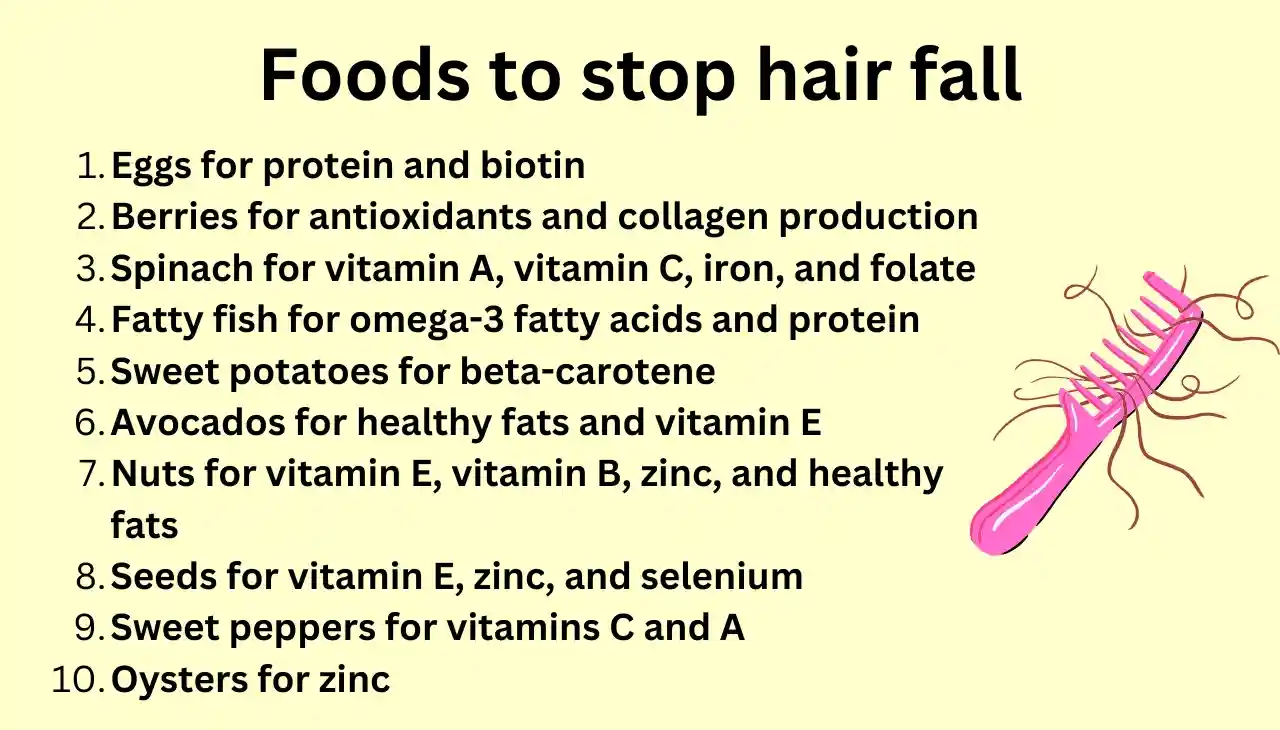
Best remedies to stop hair fall
To help prevent hair fall, consider the following remedies:
- Eat Extra Protein:
- Make sure you ingest 40 to 60 grams of protein every day. If you are vegan or vegetarian, choose protein-rich foods such as beans, lentils, eggs, or Greek yogurt.
- Take Vitamins:
- Check for vitamin deficiency. Vitamins A, B, C, D, E, zinc, and iron promote hair development. Consider supplements such as biotin forte with zinc or saw palmetto, calcium, and selenium.
- Follow the Mediterranean Diet:
- Use Over-the-Counter Hair Loss Medication:
- Minoxidil (FDA-approved) may help prevent hair loss. Low-dose oral minoxidil is also being considered as a therapy.
- Try Low-Level Laser Light Therapy:
- This newest medication, licensed by the FDA for hair growth, may be effective.
Remember, consistency matters, and consult a healthcare professional for personalized advice.
Stop hair loss and regrow hair naturally
Hair loss can be upsetting, but there are natural remedies to help prevent it and promote regeneration. Here are a few tips:
- Scalp Massage:
- A four-minute scalp massage every day can help boost hair thickness. It modulates gene expression and transfers mechanical stress to cells, resulting in better hair.
- Diet and Nutrients:
- Protein: Hair is mostly made of keratin (a protein), so make sure you’re receiving enough of it. Include foods such as eggs, lean meats, seafood, beans, and nuts.
- Iron: Iron deficiency can lead to hair loss. Consider increasing your iron intake through diet or supplements.
- Omega Fatty Acids, Zinc, and Vitamin E: These nutrients may help treat hair loss and encourage healthy growth. Pumpkin seed oil is also beneficial.
- Gentle Hair Care:
- Establish a gentle hair care routine.
- Reduce the use of heated styling tools.
- Avoid chemical hair treatments.
- Opt for loose hairstyles to prevent pulling or tugging on your hair.
Remember that consistency is essential, and outcomes may take time. If your hair loss persists, see a doctor for specific guidance.
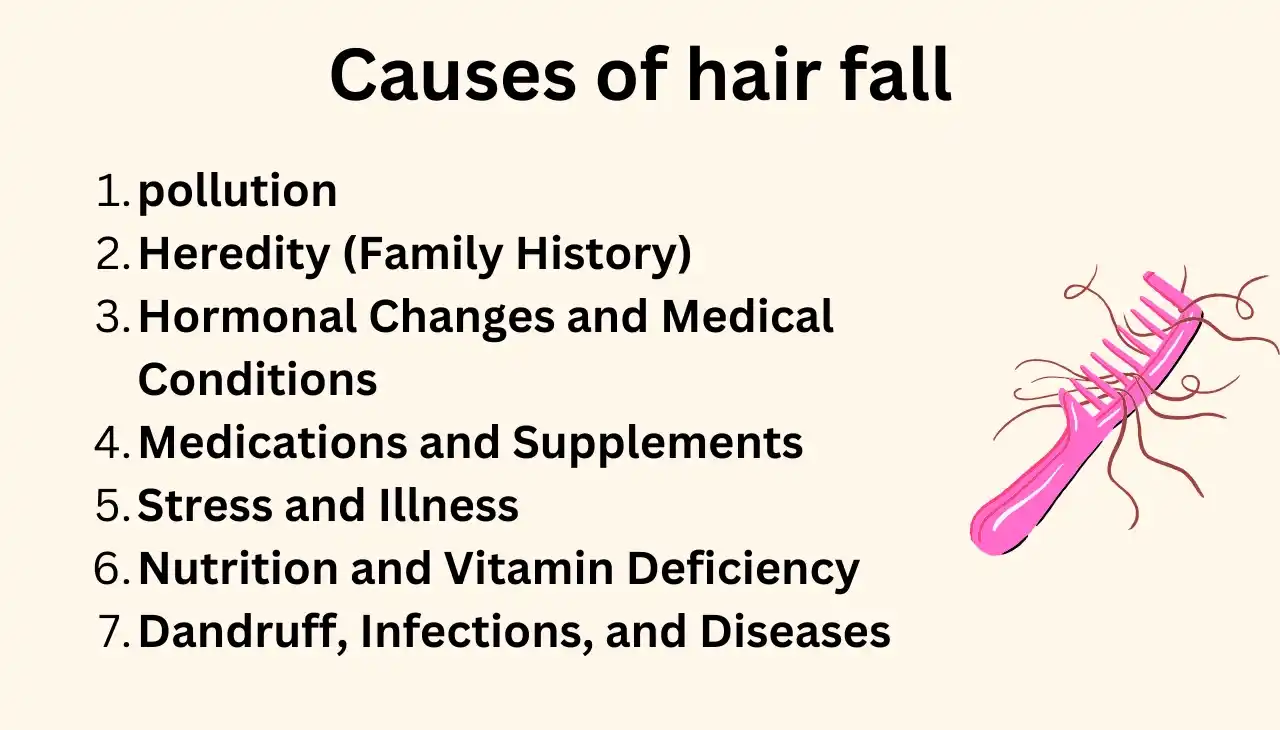
Stop your hair fall naturally
Hair fall can be concerning, but there are natural approaches you can try to reduce it. Here are some tips:
- Scalp Massage:
- Massage your scalp with hair oils or masks to increase blood flow and maybe boost hair thickness. Use your fingertips to create little circles with mild to medium pressure. Daily massages might be useful.
- Aloe Vera:
- Aloe vera has calming effects and may aid with hair loss. Apply pure aloe vera gel to your scalp many times each week, or use aloe vera shampoo and conditioner.
- Coconut Oil:
- Coconut oil includes lauric acid, which enters the hair shaft and decreases protein loss. Massage it into your scalp and hair and let it sit overnight or before washing.
- Gentle Hair Care:
- Use mild shampoos and conditioners.
- Avoid heated styling tools and chemical treatments.
- Opt for loose hairstyles to prevent hair pulling.
Remember, consistency is important, and results may take time. If hair loss persists, visit a doctor.
Foods can I eat to improve hair health?
A nutritious diet is vital for maintaining your hair in good condition. Here are some meals that might help promote hair growth:
- Eggs: Protein and biotin are vital for hair health. Protein helps hair follicles, while biotin promotes keratin formation.
- Berries: Packed with antioxidants and vitamin C, which protect hair follicles and promote collagen production.
- Spinach: Contains vitamin A, vitamin C, iron, and folate—all beneficial for hair health.
- Fatty Fish: Provides omega-3 fatty acids and protein, essential for strong, shiny hair.
- Sweet Potatoes: High in beta-carotene, which the body converts to vitamin A—a key nutrient for healthy hair.
- Avocados: Rich in healthy fats and vitamin E, supporting scalp health and hair growth.
- Nuts: Excellent sources of vitamin E, vitamin B, zinc, and healthy fats.
- Seeds: Contain vitamin E, zinc, and selenium, all beneficial for hair.
Remember to maintain a balanced diet to support optimal hair health!
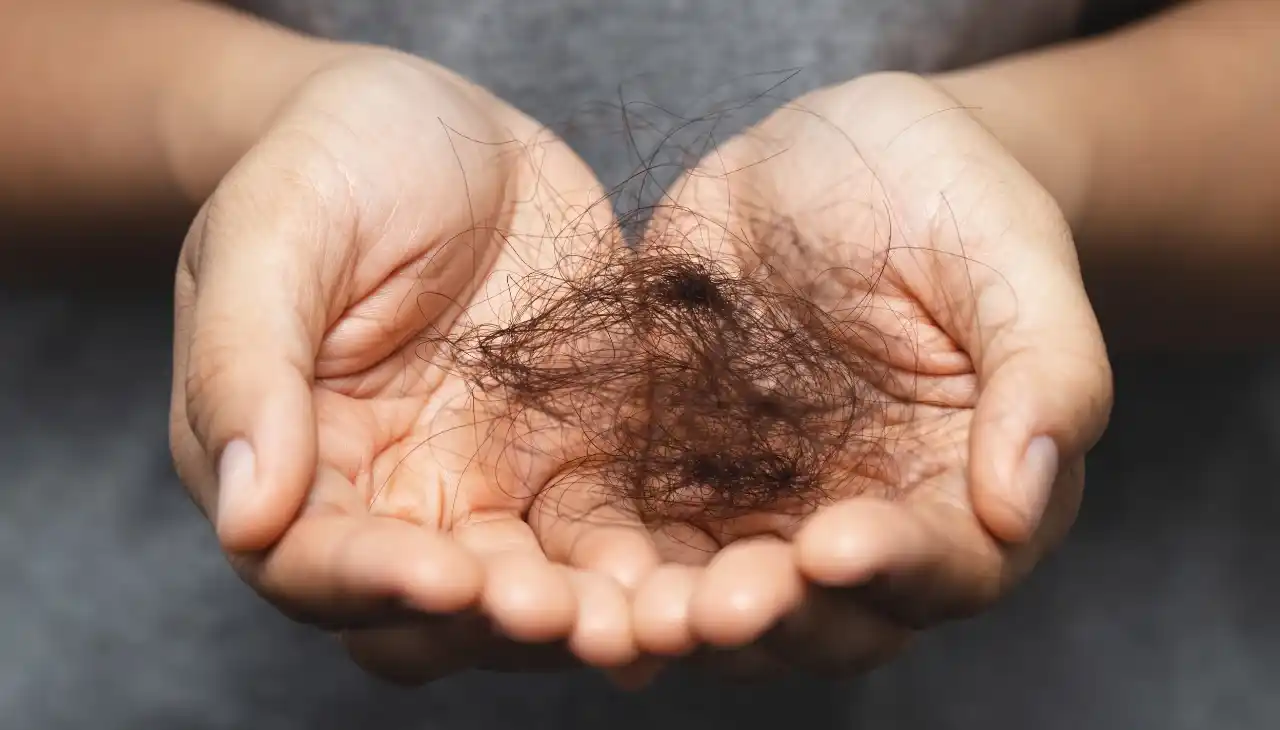
Vitamins that essential for hair growth
Vitamins have an important function in stimulating hair development. Here are some essential ones:
- Vitamin A: Essential for cell growth and overall hair health.
- Biotin (Vitamin B7): Strengthens and conditions hair. Found in whole grains, eggs, nuts, and avocados.
- Vitamin C: Fights free radicals and promotes collagen formation.
- Vitamin D: Important for overall health, including hair growth.
- Vitamin E: Supports scalp health and circulation.
Remember, a balanced diet is key, and consult a healthcare professional if you have concerns about hair loss.
Reasons of hair fall in male
Hair loss in men can occur due to various factors. Let’s explore some common reasons:
- Genetics (Androgenetic Alopecia): Most male hair loss is caused by androgenetic alopecia, often known as male pattern baldness. It is regulated by both hereditary and hormonal changes.
- Aging: As men age, hair thinning and loss can occur naturally due to changes in the body.
- Medications: Certain medicines, including anticoagulants, chemotherapeutic treatments, and some antidepressants, may cause hair loss. When you stop using these drugs, your hair usually returns.
- Stress: Excessive stress can disturb the natural hair development cycle, causing hair loss. Fortunately, stress-related hair loss is usually reversible.
- Nutrition: A poor diet low in vital nutrients (such as protein, vitamins, and minerals) can contribute to hair loss.
- Hormonal Imbalances: Elevated levels of dihydrotestosterone (DHT), a derivative of testosterone, can shrink hair follicles and cause hair thinning or loss.
- Thyroid Issues: Both hyperthyroidism and hypothyroidism can lead to hair loss due to hormonal imbalances.
- Autoimmune Conditions (Alopecia Areata): Stress exacerbates alopecia areata—an autoimmune condition where the immune system attacks hair follicles, resulting in hair loss.
Remember, seeking medical advice can help identify the specific cause of your hair loss and guide appropriate treatment options.
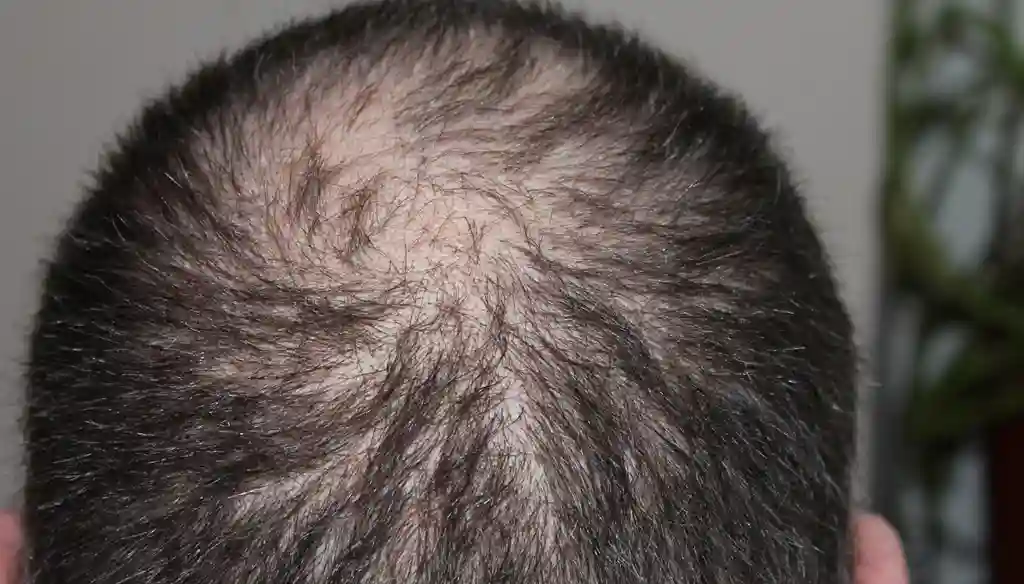
Reasons of hair fall in female
Hair loss in women can occur for a variety of causes. Let’s explore some common causes:
- Androgenetic Alopecia (Female Pattern Hair Loss): This is the most common type of hair loss in women. It leads to thinning over the top of the head and on the sides.
- Anagen Effluvium: Certain medications (like chemotherapy) compromise growing hair follicles, causing hair loss.
- Telogen Effluvium: An increased number of hair follicles enter the resting phase, leading to hair fall. Stress, health conditions, or hormonal changes can trigger this type.
- Damaged Hair Follicles: Chemical treatments, rapid weight loss, and other factors can damage hair follicles.
Remember, if you’re experiencing hair loss, consult a dermatologist to determine the underlying cause and explore treatment options.
Best oil for your hair
Choosing the right oil for your hair depends on your specific needs and hair type. Here are some beneficial oils:
- Coconut Oil: Excellent for hair repair, as it penetrates the hair shaft and helps reduce protein loss. It’s suitable for all hair types.
- Olive Oil: Great for conditioning, thanks to its monounsaturated fats. It moisturizes and protects against dryness, especially during winter.
- Argan Oil: Ideal for dyed hair, as it contains essential fatty acids that condition and protect against damage from oxidative dyes.
- Jojoba Oil: Helpful for thinning hair, as it stimulates hair follicles and promotes growth.
- Avocado Oil: Provides smoother, shinier hair. It’s rich in nutrients and beneficial for overall hair health.
- Grape Seed Oil: Effective against frizz and split ends. It’s lightweight and nourishing.
- Rosemary Oil: Supports hair thickness and growth. It’s comparable to minoxidil but with fewer side effects.
- Peppermint Oil: Increases circulation and promotes hair growth during the anagen phase.
- Cedarwood Oil: Balances oil production, reduces hair loss, and has antifungal properties.
Remember to choose an oil that suits your hair’s unique needs and preferences!
Tips to stop hair fall
- Maintaining a Nutrient-Rich Diet for Healthy Hair
- The hair-food connection is significant, with diet playing a crucial role in hair health.
- Essential nutrients for healthy hair include:
- Protein: Building Blocks of Hair: Lean meats, fish, eggs, legumes, and dairy products.
- Iron: Oxygen Courier: Red meat, spinach, lentils, and fortified cereals.
- Vitamins A and C: Helps produce sebum and collagen, strengthening hair.
- B-Vitamins: Energy Boosters: Whole grains, nuts, and avocados.
- Omega-3 Fatty Acids: Anti-Inflammatory Heroes: Fatty fish like salmon, chia seeds, and walnuts.
- Creating a hair-healthy menu: Protein-packed breakfast, smart snack, colorful lunch, and a healthy dinner. Consistency is key, as a balanced diet can lead to healthier, stronger hair.
- Natural Remedies for Hair Loss Prevention
- Essential Oils: Rosemary Oil: Promotes blood flow to the scalp, stimulating hair growth.
- Peppermint Oil: Creates a cool sensation, increasing circulation to hair follicles.
- Lavender Oil: Reduces stress and has antimicrobial properties, keeping the scalp healthy.
- Scalp Care: The foundation of healthy hair, promoting blood flow to hair follicles.
- Scalp Massage: A DIY Spa Treatment that increases blood flow to hair follicles.
- Exfoliation: Removes dead skin cells and unclogs hair follicles, creating a better environment for hair growth.
- Coconut Oil: Moisturizes the scalp, reduces protein loss, and has antimicrobial properties.
- Onion Juice: Rich in sulfur, boosts collagen production and promotes hair growth.
- Be patient and experiment until you discover what works best for you. If you are experiencing irritation, see a healthcare expert.
- Gentle Styling Practices and Avoiding Harmful Habits for Hair
- Treating Hair Like a Delicate Fabric
- Avoid excessive heat styling to prevent breakage and thinning.
- Use heat protectant spray and keep the temperature below 400°F (200°C).
- Use air-drying for a gentle alternative.
- Space out chemical treatments and use color-safe, sulfate-free hair products.
- Follow instructions carefully when using relaxers and perms.
- Avoid tight ponytail traps and use looser styles to avoid traction alopecia.
- Regular breaks and professional application of extensions are recommended.
- Quit smoking to prevent damage to hair follicles and disrupt the hair growth cycle.
- Adopt gentle hair care practices like using a wide-toothed comb, patting hair dry, sleeping on a silk or satin pillowcase, and regular trimming.
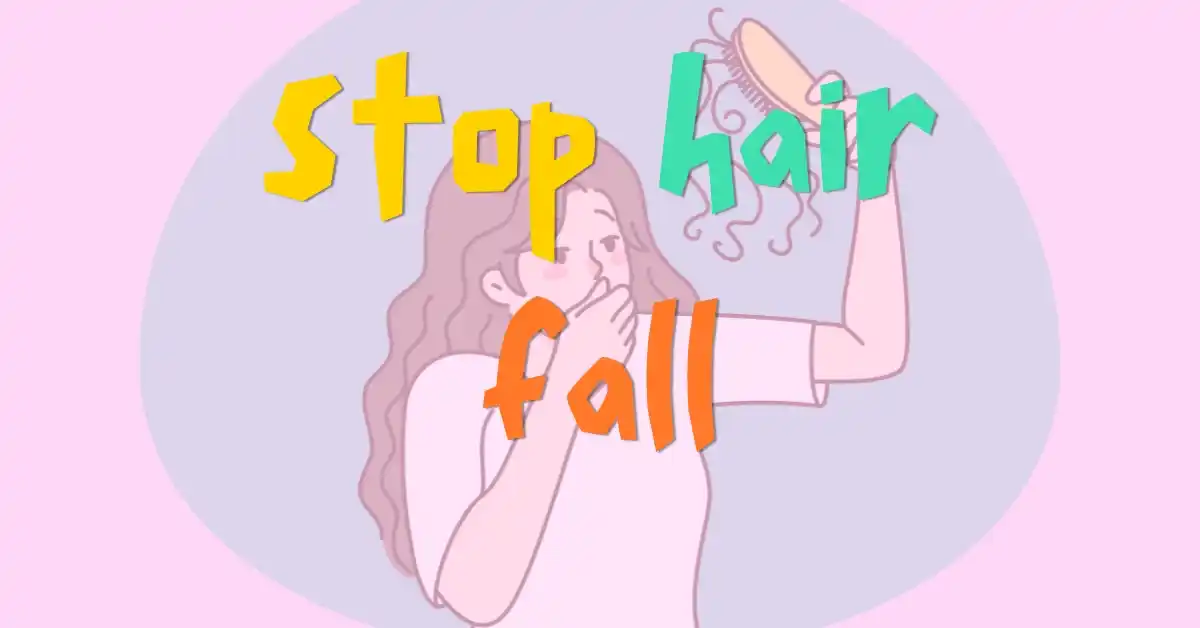
- Exploring Medical Treatments and Advanced Procedures for Hair Loss
- Low-Level Laser Therapy (LLLT): FDA-approved treatment for certain types of hair loss.
- Non-invasive, can be done at home, requires consistent use, and results can vary.
- Suitable for people with androgenetic alopecia in the early stages of hair loss.
- Platelet-Rich Plasma (PRP) Therapy: Involves drawing blood, processing it to concentrate platelets, and injecting this plasma into the scalp.
- Multiple sessions are usually needed, spaced about a month apart.
- Can be effective for both men and women with androgenetic alopecia and other types of hair loss.
Medications: The Pharmaceutical Approach
- Minoxidil: Topical medication that slows hair loss and promotes regrowth.
- Finasteride: Oral medication that blocks the hormone that causes hair follicles to shrink.
- Pros: Effective, especially for male pattern baldness.
- Cons: Prescription-only, generally not recommended for women due to potential side effects.
Important Considerations:
- Consult a professional before starting any medical treatment.
- Be patient: Most therapies require time to show benefits.
- Understand the commitment: Many treatments require ongoing use to maintain results.
- Consider combining approaches: A multi-pronged approach using a combination of treatments can yield the best results.
- Keep expectations realistic: These treatments may not restore a full head of hair if significant loss has occurred.
- Lifestyle Changes to Improve Hair Health
- Stress Management: Regular meditation, deep breathing exercises, regular exercise, and adequate sleep can help manage stress and hair loss.
- Yoga: Certain yoga poses can increase blood flow to the scalp, stimulating hair growth and reducing stress.
- Other Lifestyle Factors to Consider: Drinking Up for Healthy Hair: Aim for at least 8 glasses of water daily, infusing it with fruits or herbs for flavor.
- Sleep: Establish a consistent sleep schedule and create a relaxing bedtime routine to prevent hair loss.
- Exercise: Regular exercise improves circulation and helps deliver nutrients to hair follicles.
- Alcohol and Caffeine: Moderation is key to avoid dehydration and nutrient deficiencies, and to balance with plenty of water.
- Holistic Approach: Pay attention to how different foods, activities, and stress levels affect your hair and overall well-being.
- Be Consistent: Healthy habits take time to show results.
- Stay Positive: Maintain a positive outlook and focus on overall health and wellness.
- Embrace the journey: Everyone’s hair loss prevention journey is unique.
Seeking Professional Guidance for Hair Loss Prevention
Signs of Professional Help:
- Sudden or excessive hair loss: clumps or bald patches.
- Scalp issues: Persistent itching, redness, or scaling.
- Family history: Hair loss is a family trait.
- Lack of results: Natural remedies have not improved.
Choosing the Right Professional:
- Dermatologist: Focuses on skin, hair, and nail wellness.
- Trichologist: Specializes on hair and scalp wellness.
What to Expect at the Appointment:
- Discusses medical history, physical examination, tests, and personalized treatment plan.
- Seeking professional help is a proactive step towards healthier hair.
Conclusion
Whew! We’ve covered a lot of ground in our exploration of natural hair loss prevention. From nourishing your body with the right foods to harnessing the power of essential oils, from gentle styling practices to advanced medical treatments, we’ve unraveled the secrets to maintaining a healthy mane.
But here’s the thing: there’s no one-size-fits-all solution when it comes to hair loss prevention. Your hair is as unique as you are, and what works for your best friend or your favorite celebrity might not work for you. And that’s okay!
The key takeaways:
- Eat from within: A balanced diet rich in proteins, vitamins, and minerals is beneficial for hair.
- Treat hair with TLC: Gentle styling and natural treatments can prevent damage and promote growth.
- Mind your lifestyle: Stress management, proper sleep, and overall wellness are crucial for hair health.
- Seek help: Professional guidance and medical treatments may be necessary.
- Be patient and consistent: Hair growth takes time, so stick with your chosen methods.
- Remember, hair doesn’t define you, but it can be a fun and beautiful part of you.
FAQ:
How long does it take to see results from natural hair loss prevention methods?
Great question! The truth is, there's no one-size-fits-all answer. Hair grows about half an inch per month, so it can take several months to notice significant changes. Typically, you might start seeing some improvement in 3-6 months, but for full results, you're looking at 6-12 months of consistent effort. Remember, your hair didn't thin overnight, so it won't regrow overnight either. Patience is key!
Can stress really cause hair loss, or is that just a myth?
Oh, it's definitely not a myth! Stress can absolutely contribute to hair loss, and it's more common than you might think. There's even a specific type of hair loss called telogen effluvium that can be triggered by severe stress. When you're stressed, your body diverts resources away from non-essential functions (like hair growth) to deal with the perceived threat. Plus, stress can mess with your hormones, which can also affect your hair. So, if you're noticing more hair in your brush during stressful times, it's not just your imagination!
I've heard that wearing hats can cause hair loss. Is this true?
Ah, the old hat myth! Don't worry, your favorite cap isn't secretly plotting against your hairline. Donning a hat won't make your hair disappear overnight. However, if you're wearing extremely tight hats that put constant pressure on your hair follicles, or if you're wearing dirty hats that could lead to scalp infections, then yes, that could potentially contribute to hair loss. But for most people wearing normal hats in a normal way, you're totally fine. Rock that hat with confidence!
Are there any foods I should avoid if I'm trying to prevent hair loss?
While there aren't any foods that directly cause hair loss (unless you're allergic to them), some foods can potentially contribute to the problem if consumed in excess. Foods high in sugar and simple carbohydrates can cause inflammation in the body, which may affect hair growth. Excessively fatty or greasy foods might lead to more oil production on your scalp, potentially clogging hair follicles. And too much vitamin A (we're talking supplements here, not carrots!) can actually trigger hair loss. Finding balance is crucial in every area of our lives.. Focus on a varied, nutrient-rich diet, and your hair will thank you!
Can hair loss be a sign of a more serious health problem?
Yes, it definitely can be. While some hair loss is normal (we typically lose 50-100 hairs a day), excessive hair loss can sometimes be a sign that something else is going on in your body. Thyroid problems, autoimmune diseases, hormonal imbalances, and certain nutrient deficiencies can all manifest as hair loss. That's why it's so important to consult with a healthcare professional if you're experiencing sudden or excessive hair loss. They can help determine if your hair loss is just part of the natural aging process or if it's a symptom of an underlying health condition. Don't hesitate to get checked out – your health (and your hair) are worth it!
